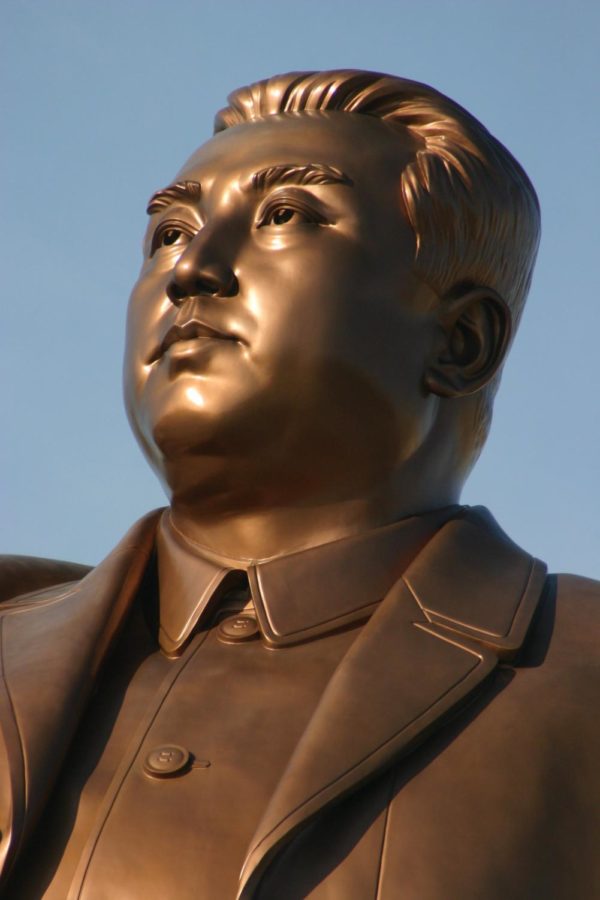Kim Jong Il’s death leaves a combustible region on edge
The giant statue of Kim Il Sung stands in Pyongyang, North Korea. This image is one of a series taken during a trip to North Korea from Feb. 23 to Feb. 27, 2008 under the auspices of the New York Philharmonic’s performance there.
December 19, 2011
The death of the North Korean leader Kim Jong Il has ushered in a period of tremendous uncertainty in Northeast Asia, with every move by countries in the region risking unpredictable reactions from others.
South Korea ramped up its level of military alert Monday following the announcement of Kim’s death, while Japan held emergency military meetings. The United States said it was in close contact with the South Korean and Japanese governments.
“It’s a moment that’s rife for miscalculation and unintended consequences,” said CNN’s Wolf Blitzer.
The region is a combustible geopolitical mix. The South, which has the support of the United States, and the nuclear-armed North, allied with China, have technically remained at war since the conflict that split the peninsula in the 1950s.
Even before Kim’s death, tensions had spiked between the two Koreas last year. The North was accused of sinking a South Korean naval vessel in the Yellow Sea and fired artillery at a South Korean island in November 2010, killing two civilians.
But the United States and other parties had appeared to make progress in recent weeks to try to rekindle negotiations over the North’s nuclear program, known as the six-party talks.
Those efforts now seem to have been in vain.
Kim’s death makes the negotiations “seem even further out of reach than they were before,” said Stephanie Kleine-Ahlbrandt, project director for Northeast Asia at the International Crisis Group, a nonprofit organization that works to prevent and resolve conflicts.
Kim had controlled the opaque, authoritarian North Korean regime for more than 15 years. The sudden announcement of his death thrusts his youngest son, Kim Jong Un, onto center stage. But the younger Kim’s intentions and leadership capabilities remain murky.
Kim Jong Un is young and inexperienced, said Mike Chinoy, a senior fellow at the US-China Institute. He added that it remained to be seen whether he would be able to consolidate his power and whether he would actually lead or just be a figurehead.
The danger, according to Kleine-Ahlbrandt of the International Crisis Group, is if the younger Kim and his close supporters find themselves in a weak position domestically and feel the need to make a show of military muscle to appear stronger.
“Then you get into the fireworks and provocation side of North Korean policy,” she said.
South Korea was already nervous about 2012, since the North was planning a nationwide, year-long celebration in 2012 to show it was “strong and prosperous” and also to honor of the 100th anniversary of the birth of Kim Il Song, the founder of the communist nation and Kim Jong Il’s father.
“Next year, I believe that the possibility of North Korea conducting additional provocations is … very high,” the South Korean defense minister, Kim Kwan-jin, said in October.
The prospect of an even more volatile situation on the Korean peninsula comes at an inconvenient time for China. The country is heading into a major leadership transition in 2012 and will have little enthusiasm for unpredictable moves from Pyongyang.
“China’s top priority on the Korean peninsula is maintaining stability,” said Kleine-Ahlbrandt, adding that it wants to avoid an imploding North Korea, refugees flooding across the border and the risk of an increased U.S. military presence on the Korean peninsula.
China has devoted considerable economic resources to maintaining the status quo in Pyongyang.
The new leadership in North Korea could indeed present an opportunity for the United States to test Kim Jong Un’s openness to change, said RAND’s Bruce Bennett, an Asia analyst who has worked with the U.S. Department of Defense, as well as the South Korean and Japanese militaries.
“We ought to try to float things to see,” he said.
But China is not the only member of the six-party talks preoccupied by internal politics in 2012: the United States and Russia both have presidential elections taking place, which could distract attention from the complex diplomatic wrangling on the Korean peninsula.







